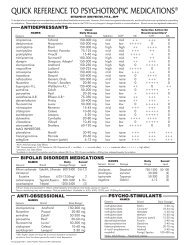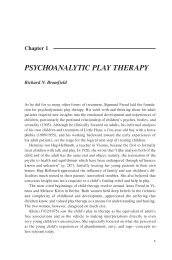IRAQ WAR CLINICIAN GUIDE
Iraq War Clinician's Guide - Network Of Care
Iraq War Clinician's Guide - Network Of Care
You also want an ePaper? Increase the reach of your titles
YUMPU automatically turns print PDFs into web optimized ePapers that Google loves.
-<br />
Iraq War Clinician Guide 197 Appendix J<br />
P<br />
WHATIF 1 HAVESLEEPPROBLEMS?<br />
A NATIONAL CENTER FOR PTSD FACTSHEET<br />
Julia M. Whealin, Ph.D.<br />
Many people who have been deployed for combat or peacekeeping experience sleep problems,<br />
for various reasons. Some individuals may suffer from nightmares related to the deployment, and<br />
wake up feeling terrified. Others may feel the need to stay awake to protect themselves from<br />
danger. For example, some service members who have been in combat feel a need to "stand<br />
guard" at night, rather than sleep. Individuals may also have poor sleep habits that lead to<br />
insomnia, such as extended napping or an irregular sleep schedule.<br />
What Can IDo If Iam Having Sleep Problems?<br />
We are creatures of habit. Our sleep habits can either make sleeping easier or more difficult. The<br />
following 10 suggestions have been shown to help reduce sleep problems:<br />
1. Keep bed only for sleep - Do not watch TV, talk on the phone, review work, study, or solve<br />
problems while in bed. Go to bed only when you are drowsy and ready for sleep.<br />
2. If you don't fall asleep within 30 minutes, get up - Go to another room and do something<br />
relaxing until you feel drowsy.<br />
3. "Wind down" before bedtime - Do something calming, like light reading, listening to soothing<br />
music, praying, taking a warm bath, doing a crossword puzzle, or playing an enjoyable<br />
computer game before bedtime.<br />
4. Have a regular bedtime and rising time - Go to sleep and wake up at the same time every<br />
day.<br />
5. Limit naps - A mid-day nap as short as 10 minutes can improve mood and mental<br />
performance. However, limit your nap to 15 minutes and don't take it later than 4pm, or the<br />
nap may interfere with your sleep cycle.<br />
6. Increase regular exercise - Just not too close to bedtime.<br />
7. Decrease stimulants - Avoid smoking, or drinking coffee or soda with caffeine in the afternoon<br />
or evening.<br />
8. Decrease alcohol - Because alcohol causes mid-night awakenings, have no more than one<br />
serving of alcohol with dinner. Of course if you are in recovery from alcohol abuse, it is<br />
important to avoid alcohol entirely.<br />
9. Inspect your bedroom environment - Is your bedroom dark and free of noise? Is your bed<br />
comfortable! Is the temperature comfortable? Do you feel safe and serene in your bedroom? If<br />
not, you can add images that are calming-a picture of your children, pet, an outdoor scene, a<br />
poem, or a prayer-to your room.<br />
10. Get help - There are treatments that can help your sleep problems. If you continue to have<br />
sleep problems, see a trained sleep specialist to help identify what is the best treatment for you.<br />
DEPARTMENT OF VETERANS AFFAIRS<br />
P<br />
-<br />
NATIONAL CENTER FOR PTSD




